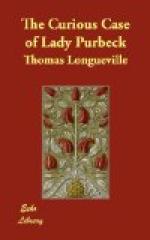Then the fact of Lady Purbeck’s returning openly to London looks as if she was conscious of innocence since she had left Sir Robert a couple of years earlier, and as if she believed that the innocence of her recent life was generally known. And, indeed, she might naturally suppose that because, as Garrard wrote, she “had not been much looked after” by the authorities, when she had gone into the country to continue her offence many years earlier, she was perfectly safe in returning to London now that she was living a life of virtue.
Sir Robert Howard, says Garrard’s letter, was sought for and taken at Suffolk House, the London home of his brother, whereas Lady Purbeck was taken at, and living at, a house “on the Water side, over against Lambeth.” This does not absolutely prove that they were not living together; but it is certainly evidence in that direction.
Again, although it is possible that the King and Laud may have believed in the revival of the criminal intercourse between Lady Purbeck and Sir Robert, it is equally possible that they did not, and that they merely considered it “boldness” and a “thing full of Impudence” to “publickly adventure to outface the Justice of the Realm,” when a woman under sentence to do public penance for grave immorality—a woman who had fled to a remote part of the country to escape from that penance—came back to London and took up her quarters “so near the Court, and in so open view,” as if nothing had happened; and that, as the sentence had never been repealed, they thought it ought to be executed.
It might even be contended that the conduct of the King and Laud looks in favour of the innocence of Lady Purbeck, at that time; for, if they had had any evidence of a fresh offence, far from being content with executing the sentence for the old transgression, they would probably, if not certainly, have prosecuted her again for the new one, and have either added to the severity of the first sentence, or passed a second to follow it, as a punishment for the second crime.
Be all this as it may, one thing is certain, namely, that the King and Laud were determined to carry out the sentence which had been passed some seven or eight years earlier, now that the escaped convict had had what Laud calls the “Impudence” to come to the capital; and it appears that Sir Robert was to be proceeded against in the Star Chamber upon the old charge.
Apart from any concern on his own account, Sir Robert was greatly distressed that Lady Purbeck should be exposed to public punishment for an offence of the past, of which he himself was at least equally guilty. In the hope of saving her from it, he took into his counsel “Sir ... of Hampshire,” some friend whose name is illegible in Laud’s MS.
We must now turn attention, for a little time, elsewhere. The first Earl of Danby was a man of great respectability, and he had distinguished himself in arms, both on sea and on land. He was a Knight of the Garter and the Governor of Guernsey, and he had been Lord President of Munster. He had always done those things that he ought to have done, with as great a regularity as his attainted elder brother, Sir Charles Danvers, had done those things that he ought not to have done.




